 Brand new from Alexandra Sokoloff comes Hunger Moon, the latest installment in The Huntress Moon Series (which is in development as a TV series!). The Huntress Moon Series is the product of years of screenwriting in Hollywood and wondering why most serial killers are men. Today, Sokoloff shares an excerpt from Hunger Moon, and writes to share what inspired The Huntress Series, and what has molded Agent Roarke’s character. As a fan of true crime and how psychology is involved (and also of small towns with neon hotel signs), I can only begin to try to communicate through my fingers how interesting this series sounds.
Brand new from Alexandra Sokoloff comes Hunger Moon, the latest installment in The Huntress Moon Series (which is in development as a TV series!). The Huntress Moon Series is the product of years of screenwriting in Hollywood and wondering why most serial killers are men. Today, Sokoloff shares an excerpt from Hunger Moon, and writes to share what inspired The Huntress Series, and what has molded Agent Roarke’s character. As a fan of true crime and how psychology is involved (and also of small towns with neon hotel signs), I can only begin to try to communicate through my fingers how interesting this series sounds.
Hunger Moon
Alexandra Sokoloff
Publication date: October 24, 2017
Genres: Adult, Mystery, Thriller
“Some of the most original and freshly unnerving work in the genre.” – The New York Times
From the Author: Where The Huntress Moon Series came from
“My motivation for writing the Huntress Moon series is pretty basic. I am sick to death of reading crime novels and seeing movies and TV shows about women being raped, tortured, mutilated and murdered. I’m not too happy about it happening in real life, either.
So, my Huntress series turns the tables. The books follow a haunted FBI agent on the hunt for a female serial killer.
I worked as a Hollywood screenwriter for ten years before I snapped and wrote my first novel, and in that time I worked on several film projects featuring serial killers. One of my core themes as a writer is ‘What can good people do about the evil in the world?’ – and as far as I’m concerned, serial killers are an embodiment of evil. So for several years I was doing research into the subject every way I could think of, besides actually putting myself in a basement with one of these monsters. I tracked down the FBI’s behavioral science textbook before it was ever available to the public. I stalked psychological profilers at writing conventions and grilled them about various real life examples. I went to forensics classes and law enforcement training workshops.
And while I was doing all that research, one thing really jumped out at me about serial killers. They’re men. Women don’t do it. Women kill, and sometimes they kill in numbers (especially killing lovers or husbands for money – the “Black Widow” killer; or killing patients in hospitals or nursing homes: the “Angel of Death”). But the psychology of those killers is totally different from the men who commit serial sexual homicide. Sexual homicide is about abduction, rape, torture and murder for the killer’s own sexual gratification. (And please don’t get me started on books and films that portray serial killers as having an artistic or poetic bent. Ridiculous….)
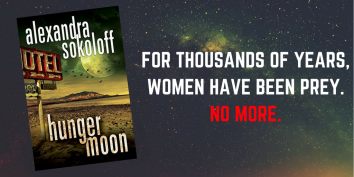 The fact is, one reason novels and film and TV so often depict women as victims is that it’s the stark reality. Since the beginning of time, women haven’t been the predators — we’re the prey. But after all those years (centuries, millennia) of women being victims of the most heinous crimes out there… wouldn’t you think that someone would finally say, ‘Enough!’?
The fact is, one reason novels and film and TV so often depict women as victims is that it’s the stark reality. Since the beginning of time, women haven’t been the predators — we’re the prey. But after all those years (centuries, millennia) of women being victims of the most heinous crimes out there… wouldn’t you think that someone would finally say, ‘Enough!’?
And maybe even strike back?
I believe my job as an author is to give my readers a thrilling, sensory, gripping adventure that makes them feel — and also makes them think. It’s all about the fight against everyday evil, for me, and about the deep connections people make with unlikely other people when they commit to that fight.
With the Huntress series I finally have an umbrella to explore, dramatically, over multiple books, the roots and context of the worst crimes I know. And at least on paper, do something about it.
Whoever she is, whatever she is, the Huntress is like no killer Agent Roarke – or the reader – has ever seen before. And you may find yourself as conflicted about her as Roarke is.
As one of the profilers says in the book: ‘I’ve always wondered why we don’t see more women acting out this way. God knows enough of them have reason.'”
Excerpt from Hunger Moon:
A bleak sky, streaked with white, stretches over the desolate South Rim of the canyon. There will be snow tonight.
The grinding of a pickup truck grates through the silence.
A four-door Tundra. Tonneau cover over the bed. Two men dressed in camouflage inside. Fast-food and jerky wrappers litter the wells at their feet. In the back seat, a cooler packed full of beer.
And three rifles, three-inch twelve-gauge magnums, strapped to the padded back-seat gun rest.
Hunters, driving the rim.
The front-seat passenger sets his sights on something moving ahead of them, leans forward greedily. “There we go, there we go.”
The driver follows his gaze, fixes on what he is tracking. Not a deer, but a young girl, shining black hair underneath the hood of her parka. Schoolgirl’s backpack on her shoulder.
On the men’s faces, something crude and capering.
“That’s some tasty-looking pussy.”
“Oh, yeah, that’ll do.”
“Let’s go.”
“Get her.”
The driver swerves the truck over to the side of the road, squealing brakes.
The girl hears the sound, stiffens, is starting to run before she even completes the glance back.
The truck skids to a stop in the snow. The doors fly open; the men are out of the car, grabbing for their rifles.
The girl runs for the rocks, but her pursuers are bigger, faster. Two of them, grown men, against a teenage girl.
They move forward into the strong wind, a military-style formation, heavy boots crunching in the sandy snow.
They pause at the rock outcropping, looking out over the boulders. The girl seems to have disappeared. Then a scrabble on the rocks betrays her. Hearing it, the men grin at each other.
The driver rounds the rock first, his mouth watering. He is already hard in anticipation…
The tire iron bashes him across the face, breaking his jaw. He staggers back, howling inarticulate pain.
The girl kicks him viciously in the knee, crumpling him, then swivels as the second hunter rounds the edge of the rock. She slams the tire iron against the side of his head.
Now both men are collapsed on the ground, moaning and cursing.
She steps forward, no longer feigning that youthful, hesitant gait.
She lifts her arm and uses the tire iron on their skulls. Two, three, four blows, and there is no more moaning. Thick crimson drops spatter the snow. Her breath is harsh. Her face is ice.
There is only the wind, swallowing the sound of her breathing.
Cara stands at the edge of the canyon, looking out at the spires of Spider Rock, the vast open gorge.
Below her is an icy crevasse. The canyon has any number of them, deep splits in the rock wall where whole sheets of the cliff have broken away. Behind her is the hunters’ pickup truck.
Their bodies lie at her feet.
She drags one, then the other, to shove them over the cliff’s edge, stepping back to watch each body hurtle down into the crevasse, tumbling into oblivion.
The snowfall tonight will cover all trace of them. Later, birds and animals will pick the bones clean.
Another offering to the canyon, and the gods and ghosts that haunt it.
Goodreads / Amazon
Pre-order today!
PLUS: Books 1-4 are on SALE for $1.99 each for a limited time only!
Previous books in the Huntress/FBI Thrillers Series:
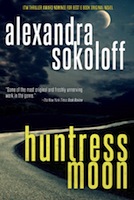
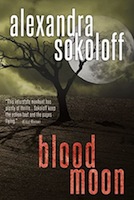
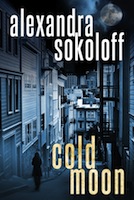
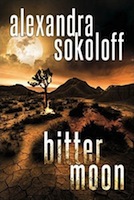

About the Author
ALEXANDRA SOKOLOFF is the Thriller Award-winning and Bram Stoker, Anthony, and Black Quill Award-nominated author of the Amazon bestselling Huntress/FBI series (Huntress Moon, Blood Moon, Cold Moon, Bitter Moon, Hunger Moon – now in active development as a TV series), and the supernatural Haunted thrillers (The Harrowing, The Price, The Unseen, Book of Shadows, The Shifters, The Space Between). The New York Times Book Review called her a “daughter of Mary Shelley,” and her books “some of the most original and freshly unnerving work in the genre.”
As a screenwriter she has sold original horror and thriller scripts and adapted novels for numerous Hollywood studios. She has also written three non-fiction workbooks: Screenwriting Tricks for Authors, Stealing Hollywood, and Writing Love, based on her internationally acclaimed workshops and blog (www.ScreenwritingTricks.com), and has served on the Board of Directors of the WGA West and the Board of the Mystery Writers of America.
Alex is a California native and a graduate of U.C. Berkeley, where she majored in theater and minored in everything Berkeley has a reputation for. In her spare time (!) she performs with The Slice Girls and Heather Graham’s all-author Slush Pile Players, and dances like a fiend. She is also very active on Facebook, Twitter, and Pinterest. But not an addict. Seriously, it’s under control.
Website / Goodreads / Facebook / Twitter

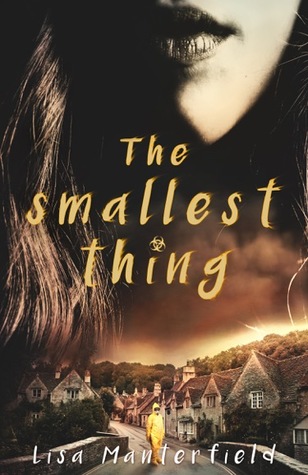

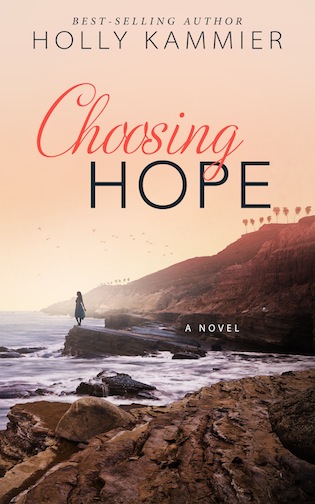


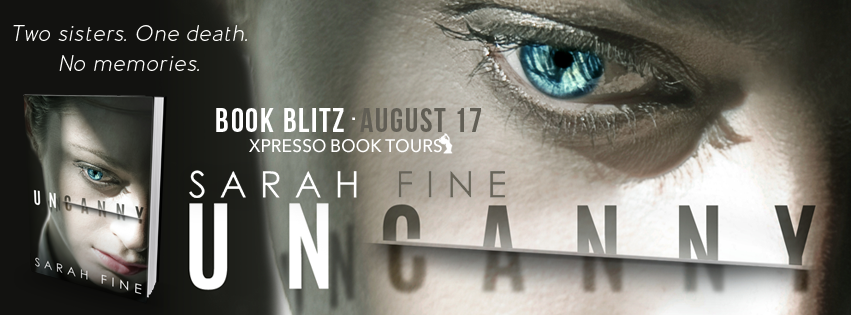
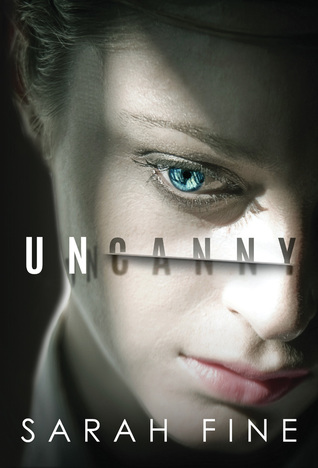


 Brand new from Alexandra Sokoloff comes Hunger Moon, the latest installment in The Huntress Moon Series (which is in development as a TV series!). The Huntress Moon Series is the product of years of screenwriting in Hollywood and wondering why most serial killers are men. Today, Sokoloff shares an excerpt from Hunger Moon, and writes to share what inspired The Huntress Series, and what has molded Agent Roarke’s character. As a fan of true crime and how psychology is involved (and also of small towns with neon hotel signs), I can only begin to try to communicate through my fingers how interesting this series sounds.
Brand new from Alexandra Sokoloff comes Hunger Moon, the latest installment in The Huntress Moon Series (which is in development as a TV series!). The Huntress Moon Series is the product of years of screenwriting in Hollywood and wondering why most serial killers are men. Today, Sokoloff shares an excerpt from Hunger Moon, and writes to share what inspired The Huntress Series, and what has molded Agent Roarke’s character. As a fan of true crime and how psychology is involved (and also of small towns with neon hotel signs), I can only begin to try to communicate through my fingers how interesting this series sounds. The fact is, one reason novels and film and TV so often depict women as victims is that it’s the stark reality. Since the beginning of time, women haven’t been the predators — we’re the prey. But after all those years (centuries, millennia) of women being victims of the most heinous crimes out there… wouldn’t you think that
The fact is, one reason novels and film and TV so often depict women as victims is that it’s the stark reality. Since the beginning of time, women haven’t been the predators — we’re the prey. But after all those years (centuries, millennia) of women being victims of the most heinous crimes out there… wouldn’t you think that 





